One in 20 adults experience domestic abuse every year, that’s almost 21,000 people a year in Buckinghamshire or 57 people every day. People may live with abuse for a long period of time before seeking help. Together, we must change this. We need to talk about the signs of controlling behaviour and domestic abuse and look out for our relatives, friends, colleagues, neighbours and people in our community.
Buckinghamshire Council is working to raise awareness of the signs of domestic abuse and the support that is available.
Recognising red flags
This list can help you to recognise if you, or someone you know, are in an abusive relationship.
How does your partner make you feel?
- Really special - Love bombing - excessive attention, admiration, and affection to influence and control you
- A lot more critical of yourself
- You think your partner is right about everything
- You need to change to make them happy
- More stressed due to your relationship
- Like you’re walking on eggshells
- Threatened or frightened
- Pressured to change
- Like you can’t escape
Does your partner use these controlling and abusive behaviours?
- Stops you seeing family and friends?
- Looks through your phone, social media or web history?
- Wants to know where you are all the time?
- Controls your finances and money?
- Tells you what to wear, where to go and what to think?
- Insists on driving you everywhere and picking you up?
- Puts you down when you’re alone or around friends?
- Makes you do things that you don’t want to?
- Makes you feel guilty if you don’t spend time with them?
- Cheats on you or accuses you of cheating?
- Steals from you or makes you pay for things?
- Lies to you?
- Gaslights you?
- Hurts you - hits, slaps or pushes you?
- Makes you have sex when you don’t want to?

Have you noticed any changes in those close to you that could be a red flag?
- Changes in behaviour or demeanour
- Changes in physical appearance and clothing
- Changes in contact pattern
- Changes in work behaviour
Get help and support
Women
24-hour National Domestic Abuse Helpline
Supports women and children affected by domestic abuse.
Call: 0808 2000 247
Live online chat (Monday to Friday, 3pm to 10pm)
Women who are experiencing abuse please contact Women’s Aid nearest to you:
- Call 01269 437 777
- Fill in an online form
- Email [email protected]
- Call 01494 461367
- Fill in an online form
- Email [email protected]
Men 16+
Sexual Assault and Abuse Support Service Buckinghamshire and Milton Keynes supports male victims of domestic abuse who are over 16.
- Call: 01296 719 772 (if you do not get a reply, leave a voicemail and someone will call you back)
- Email: [email protected]
- Filling in a contact form
LGBT+
Galop supports LGBT+ people who have experienced domestic abuse.
Call: 0800 999 5428.
Young people and their families
SAFE supports children and families who have been affected by crime or domestic abuse.
- Call: 0800 133 7938
If you're worried that you are hurting someone else
It takes strength to be able to take responsibility for your actions. If you think you might be treating a partner, ex-partner or family member in a way that's hurting them, you can get support to help you stop this cycle of abuse.
Respect is an anonymous and confidential helpline for men and women who are harming their partners and families. You can call them on 0808 802 4040 or use their webchat service during the week.
GOV.UK also have lots of advice if you're worried about your behaviour, including finding ways to change.
Report abuse and how you can help
If abuse is taking place now, or there is a situation that may become heated or violent, you should:
- Call the police on 999
- Contact 18000 if you are a textphone user
- Text the police on 999 (but you must be registered for the emergencySMS service)
If you are not able to speak on the telephone, call the police on your mobile
phone using 999, then press 55 to get help through the silent solution system.
Report abuse that is not an emergency
If the situation is not an emergency:
- Call the police on 101
- Make a report to the police online
- Make a report at a police station (find your local police station)
- Contact 18000 if you are a textphone user

How you can help
Friends and family are more likely to be aware of abuse than anyone else and individuals who experienced domestic abuse are more likely to tell someone personally close to them than official support.
Many people are worried about reporting abuse or seeking help in fear that it will make it worse or they won’t be believed.
If you are worried someone you know is experiencing abuse
- Let them know you’ve noticed something is wrong
- Listen to them – provide a non-judgemental listening ear
- Make sure they know you believe them
- Support them but allow them to make their own decisions
- Direct them to the support contacts above when they feel ready
- Don’t tell them to leave a relationship if they are not ready
- Help them with a safety plan to keep them safe.
Women’s Aid have information and resources about helping someone experiencing abuse.
How to delete your web history
Google Chrome App - Android/ IO - Apple
- Open the Chrome app
- In the top right corner tap ‘...’ the 3 dots
- Click ‘History’
- Tap ‘Clear browsing data…’
- Tap next to ‘Time range’ to select how much history you want to delete
- Check ‘Browsing ’ Check any other data you want to delete
- Tap ‘Clear data’ or ‘Clear browsing data’
Chrome – Windows/ Mac computer
- Open Chrome
- Click ‘…’ 3 dots top right of browser
- Click ‘History’ or Ctrl + Shift +T
- Click ‘Clear browsing data’
- Select the time range you want to delete e.g 24 hours
- Select the types of information you want to remove
- Click 'Clear data'
Safari
- Open Safari
- Click book icon from bottom menu
- Click clock icon
- Click ‘clear’
Edge
- Click ‘…’ 3 dots top right of browser
- Click ‘History’ or Ctrl + H
- Click ‘Clear browsing data’
- Select the time range you want to delete e.g 24 hours
- Select the types of information you want to remove
- Click 'Clear data'
For further information and other browsers please see the Thames Valley Police webpage How to hide this visit from your web history.
